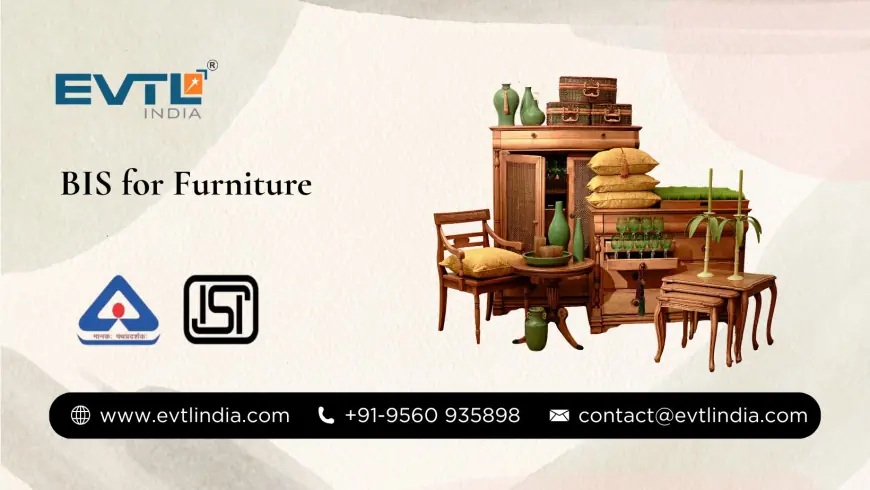The Rise of Quality Furniture: Why BIS for Furniture Is a Game-Changer in India

Walk into any modern Indian home or office today, and you'll notice a shift—not just in design but in quality. Furniture is no longer just about aesthetics; it's about safety, strength, sustainability, and compliance. This is where BIS certification for Furniture comes in—a seal that tells you, “Yes, this product has met the national standards of quality and safety.”
With the rapid rise in demand for ergonomic chairs, modular office setups, and eco-conscious wooden fixtures, both manufacturers and consumers are waking up to the need for more than just good looks. They want furniture that lasts, performs, and most importantly, complies with national standards.
Why Certification in the Furniture Industry Matters More Than Ever
In a country like India, where unorganized sectors often dominate the furniture market, ensuring standardization was long overdue. A poorly constructed chair can break. A substandard table can collapse. And let’s not even talk about the harmful chemicals some cheap furniture contains.
The Indian government has taken a strong stance on product safety across industries, and the furniture sector is no exception. That’s where the ISI Mark for Furniture makes its mark—pun intended. It isn’t just a sticker; it’s proof that the furniture has passed stringent Indian standards under the Bureau of Indian Standards (BIS).
What’s Behind the Certification?
Every type of furniture has its own relevant Indian Standard (IS) code. For example:
-
Office chairs follow IS 17631:2022
-
Tables may be required to comply with IS 8126
-
School furniture follows separate child-safety-focused IS standards
Once a product meets all the prescribed safety, durability, and performance criteria, it becomes eligible for the ISI Certification for Furniture. This process involves:
-
Factory inspection
-
Product testing in BIS-approved labs
-
Surprise audits and quality checks
-
Ongoing compliance monitoring
This ensures that the product quality isn’t just a one-time thing—it’s maintained consistently over time.
What Manufacturers Must Understand
If you're a furniture manufacturer—whether you're working with metal, wood, plastic, or hybrid materials—getting certified is not just a formality anymore. For many categories, BIS compliance has become mandatory under the QCO (Quality Control Order). That means selling uncertified products could soon lead to legal action, product recalls, or market bans.
And even where it's not mandatory yet, big retail chains, B2B buyers, and even e-commerce platforms are starting to demand compliance. A BIS-certified product isn’t just safer; it’s easier to sell.
How Does Certification Boost Consumer Confidence?
Think like a buyer for a moment.
You're choosing between two study tables. One has an ISI mark on it, indicating it’s tested for strength, edge finish, toxic emissions, and durability. The other one looks nice but has no proof of quality.
Which one would you pick?
This is exactly why certification matters. When a product is BIS-certified, customers automatically trust it more. In many ways, the ISI mark has become a silent sales agent for brands. It tells customers, “You’re making the right choice.”
The Role of a BIS Consultant for Furniture
The process of obtaining certification is technical, time-consuming, and often confusing. That’s where a professional consultant steps in. From document preparation to application submission, sample testing to inspection coordination—they handle the entire lifecycle of certification.
But a good consultant does more than just submit your paperwork. They guide you through production-level improvements to ensure that your furniture doesn’t just pass the test—it excels.
Which Furniture Categories Need Attention?
Here’s a look at popular furniture products that are either already under BIS radar or expected to be soon:
-
Ergonomic work chairs
-
Office tables and conference units
-
Wooden wardrobes and cabinets
-
Modular kitchen units
-
Metal cots and hospital furniture
-
School benches and classroom desks
Some of these are under mandatory compliance, while others are likely to be included in future notifications under the QCO regime.
Exporters: Your International Gateway Starts with BIS
Indian furniture manufacturers exporting to global markets like Europe, the US, and the Middle East are also realizing the power of Indian certification. Many countries recognize BIS standards as equivalent or complementary to their own. Having a certified product simplifies trade, reduces the chances of rejection, and boosts the credibility of your brand abroad.
And let’s face it—India’s furniture export market is booming. But without solid compliance records, the growth may hit a ceiling.
Don’t Ignore Indoor Air Safety
An emerging dimension of compliance is formaldehyde emission and VOC (Volatile Organic Compound) standards in wooden or laminated furniture. As Indian households become more health-conscious, BIS is moving toward stricter norms around materials and finishes. A painted table isn’t just a visual element—it could be a health hazard if it emits toxins.
Certification ensures that furniture meets standards not just of strength, but also of indoor environmental safety.
Conclusion
EVTL India is one of the leading BIS Consultant in India, helping manufacturers obtain their BIS licences hassle-free. In today’s market, the difference between a premium furniture brand and an average one isn’t just design or price. It’s compliance. It’s credibility. It’s the BIS certification for Furniture that sets the winners apart.
Yes, the process can be complex. Yes, it may take time and effort. But the long-term benefits—legal peace of mind, customer trust, better market positioning—are more than worth it.
What's Your Reaction?
 Like
0
Like
0
 Dislike
0
Dislike
0
 Love
0
Love
0
 Funny
0
Funny
0
 Angry
0
Angry
0
 Sad
0
Sad
0
 Wow
0
Wow
0

















































